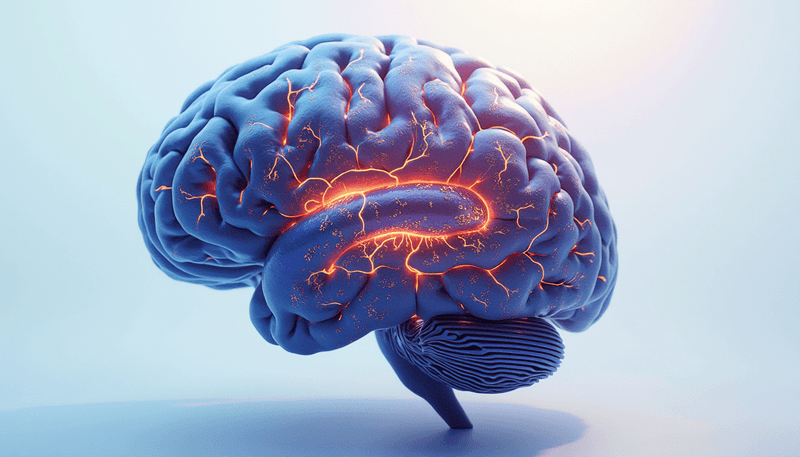Hidden Medical Causes Behind Mental Health

Have you ever felt like your brain was "on fire" despite taking prescribed medications for anxiety or depression? A groundbreaking case study reveals how undiagnosed medical conditions can masquerade as mental health issues, leaving many women struggling with treatment-resistant symptoms. This fascinating research follows a 51-year-old woman's journey from persistent depression to discovering multiple underlying health conditions that were fueling her mental health challenges.
The Hidden Connection: Hormones and Mental Health
When Sarah (name changed) came to her healthcare provider, she had been taking maximum doses of psychiatric medications for years without relief. Her symptoms would worsen dramatically before her menstrual cycle, leading to severe depression and anxiety. What her previous doctors missed was a complex web of hormonal imbalances - including low progesterone, testosterone, and thyroid function - all working together to intensify her mental health symptoms.
"Sometimes what appears as depression might actually be your body crying out for hormonal balance."
Think of hormones as the body's chemical messengers. When these messengers get scrambled or depleted, it's like having a phone with poor reception - the signals for mood regulation, energy, and emotional well-being don't get through clearly. This is particularly relevant during perimenopause, when hormonal fluctuations can trigger or worsen mood disorders.
The Vitamin D-Depression Link
One surprising finding was the patient's severe vitamin D deficiency. Recent research suggests that low vitamin D levels can significantly impact mood and mental health. Think of vitamin D as sunlight for your brain - without enough of it, your mood can become as gloomy as a rainy day.
Practical steps to optimize your vitamin D levels:
- Get 15-20 minutes of morning sunlight daily
- Consider vitamin D testing, especially if you experience persistent low mood
- Include vitamin D-rich foods like fatty fish and egg yolks in your diet
- Discuss supplementation with your healthcare provider if levels are low
Have you noticed your mood changing with the seasons? This could be a sign of vitamin D deficiency.
The MTHFR Gene: Your Body's Processing Power
Perhaps the most intriguing discovery was the presence of MTHFR gene variants. This gene affects how our bodies process certain nutrients, particularly B vitamins and folate. When it's not functioning optimally, it can impact everything from mood to energy levels.
Think of MTHFR like a factory worker responsible for processing raw materials (vitamins) into usable forms. When this worker isn't operating at full capacity, the whole production line (your body's biochemical processes) slows down.
What this means for your daily life:
- Standard folic acid supplements might not work well for you
- Processed foods fortified with folic acid could actually make you feel worse
- Natural folate from leafy greens and legumes might be better absorbed
- A specialized form of folate (methylfolate) might be more beneficial
Could your body's ability to process vitamins be affecting your mental health? Ask your healthcare provider about MTHFR testing.
Putting It All Together: A Holistic Approach
The key lesson from this research is that mental health symptoms often have multiple underlying causes. Just as a car won't run properly with a dead battery AND flat tires, our brains can't function optimally when multiple systems are out of balance.
Action steps you can take:
- Track your symptoms, especially in relation to your menstrual cycle
- Request comprehensive hormone testing if you have persistent mood issues
- Consider vitamin D and thyroid testing as part of your mental health workup
- Discuss genetic testing options with your healthcare provider
The woman in this study experienced significant improvement once all her underlying conditions were addressed. Her brain no longer felt "on fire," and she regained her quality of life through a combination of hormone therapy, proper supplementation, and continued mental health support.
Take the first step today: Schedule a comprehensive health assessment if you're experiencing persistent mental health symptoms, especially if traditional treatments haven't provided adequate relief. Your body might be telling you something that standard psychiatric care alone can't address.
What underlying factors might be contributing to your mental health challenges?

Dr. Marcus Anthony Bennett
Dr. Marcus Bennett is a Seattle-based freelance medical writer and consultant specializing in mid-aged women's health. With a background in internal medicine and over a decade of experience in preventive care, he is dedicated to making complex health topics accessible. Dr. Bennett completed his MD at Johns Hopkins School of Medicine and residency at the University of Washington. His empathetic and evidence-based approach combines traditional medical expertise with a focus on health disparities, often incorporating practical lifestyle advice. Known for his clear, engaging communication, Dr. Bennett provides actionable insights to empower his audience.






